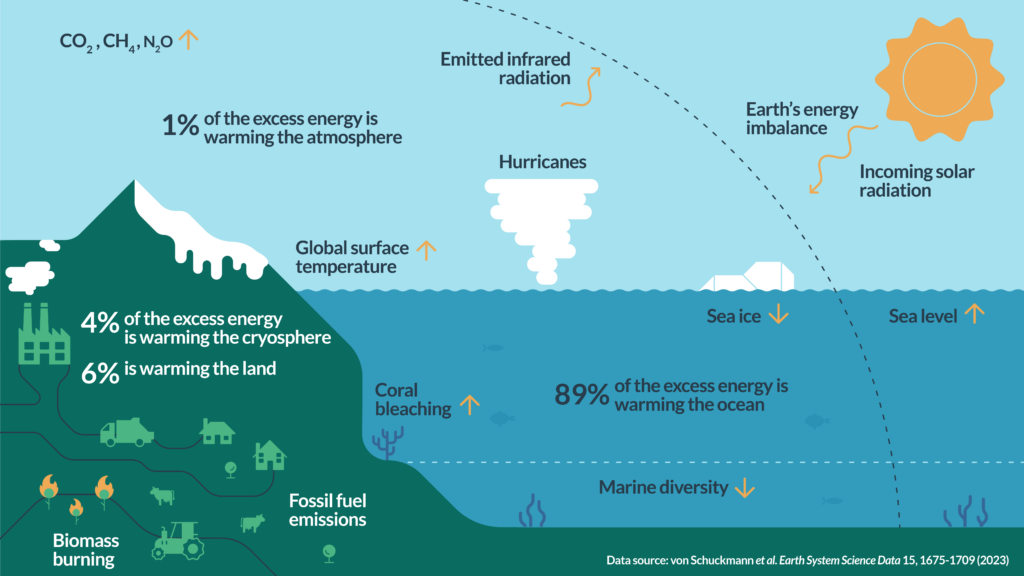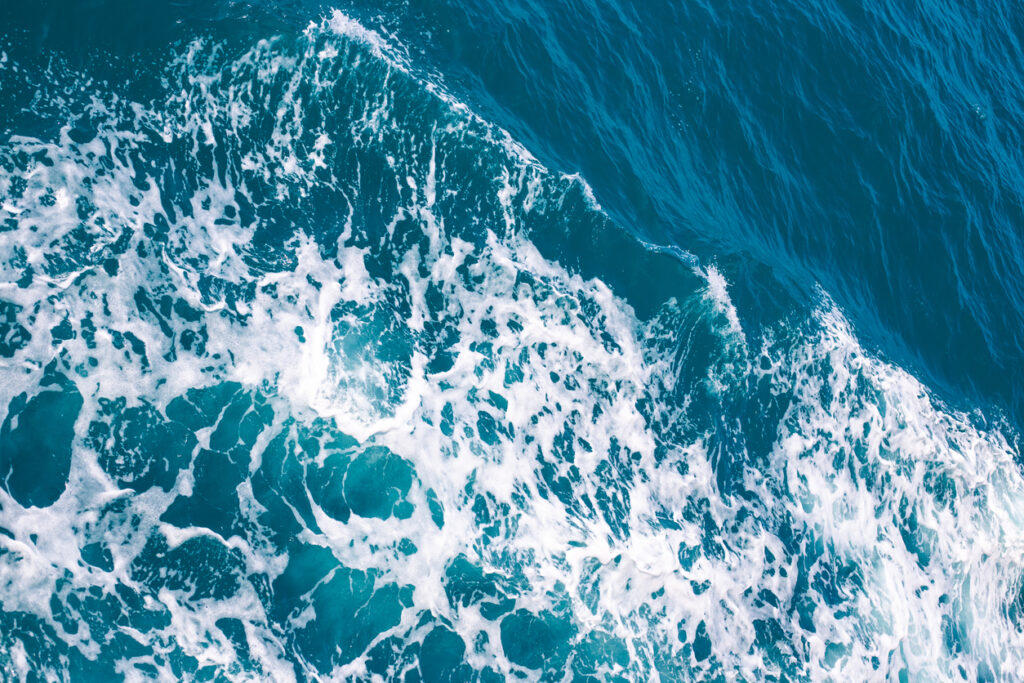Experts from Mercator Ocean International (MOi) joined over 100 members of the scientific community from 28 countries to contribute to the State of the Ocean Report 2024. The report, published by the Intergovernmental Oceanographic Commission/United Nations Educational, Scientific and Cultural Organization (IOC-UNESCO), aims to represent a key resource for policymakers, researchers, environmentalists and the public to understand the current state of the Ocean and plan future actions accordingly. Authors from Mercator Ocean including Director-General Pierre Bahurel and Karina von Schuckmann, oceanographer specialised in Ocean climate, contributed with two articles respectively on Ocean prediction capabilities for sustainable development and on Ocean warming. The two contributions offer current insights into Ocean warming and its ecological impacts, as well as the present status and future outlook of Ocean prediction systems.
The IOC-UNESCO State of the Ocean Report
The State of the Ocean Report is a comprehensive annual publication coordinated by the IOC-UNESCO and launched for the first time during the 2022 United Nations Ocean Conference. The report has the ambition to contribute to a series of international processes and initiatives such as the 2030 Agenda, and in particular Sustainable Development Goal (SDG) 14 – Life Below Water to “Conserve and sustainably use the oceans, seas and marine resources“, as well as the United Nations Framework Convention on Climate Change (UNFCCC), the Convention on Biological Diversity and the Sendai Framework for Disaster Risk Reduction. = Providing reporting on the state of the Ocean, the report also offers insights on Ocean-related scientific activities and analyses for an informed policymaking.
The 2024 edition saw more than 100 international scientists from 28 countries contribute to the collective effort with articles addressing physical, chemical, ecological, socio-economic and governance aspects of the Ocean. The content is structured around the seven UN Decade of Ocean Science for Sustainable Development Outcomes, which describe the Ocean We Want by 2030:
- A clean Ocean where sources of pollution are identified and reduced or removed
- A healthy and resilient Ocean where marine ecosystems are understood, protected, restored and managed
- A productive Ocean supporting sustainable food supply and a sustainable Ocean economy
- A predicted Ocean where society understands and can respond to changing Ocean conditions
- A safe Ocean where life and livelihoods are protected from Ocean-related hazards
- An accessible Ocean with open and equitable access to data, information and technology and innovation
- An inspiring and engaging Ocean where society understands and values the Ocean in relation to human wellbeing and sustainable development
Leading scientists and experts from Mercator Ocean International participated by co-authoring two articles which respectively focus on outcome 2 (a healthy and resilient Ocean) and 4 (a predicted Ocean).
The Ocean’s Unprecedented Warming
MOi’s Karina von Schuckmann co-authored an article on Ocean warming together with Lijing Cheng from the Chinese Academy of Science. The article describes the unprecedented warming of the Ocean – from the surface down to the abyss – caused by anthropogenic global warming, reflecting on the more precise assessments brought by new measurements techniques. The authors observe that the upper 2,000 meters of the Ocean have been warming at an increasing rate since 1960 and this trend is expected to continue, highlighting that the rate of Ocean warming has doubled over the past two decades as compared to the long-term rate (Figure 1) In 2023, regions like the Tropical Atlantic Ocean, the Mediterranean Sea, and the Southern Ocean recorded their highest levels of Ocean Heat Content (OHC) since the 1950s. Ocean warming is leading to more frequent and intense marine heatwaves, which are extreme rises in Ocean temperature for an extended period of time, in specific regions. Other consequences of Ocean warming include the contribution to the observed sea-level rise and change in Ocean currents.

Fostering Sustainable Development with Ocean Predictions
Mercator Ocean’s Director-General Pierre Bahurel, Enrique Alvarez Fanjul (technical coordinator of OceanPrediction Decade Collaborative Centre) and Yann Drillet (Head of research & Development Department) contributed to the article on Ocean prediction capabilities led by Nadia Pinardi (oceanographer, University of Bologna, Italy).
The article explores how Ocean predictions can advance several Sustainable Development Goals (SDGs), such as protecting marine life, combating climate change, and promoting sustainable resource management. While modern systems have significantly reduced prediction errors, benefiting global, regional, and coastal areas, the authors argue that several challenges remain, including a significant imbalance in the availability of forecasting systems between the Northern and Southern Hemispheres, which present differences in the availability of supercomputing resources, as well as a lack of real-time data for biogeochemical factors, affecting prediction accuracy. The article emphasises that Collaborative structures within the Ocean Decade, such as the OceanPrediction Decade Collaborative Center (DCC), hosted by MOi, represent a great opportunity to improve Ocean forecasting through collaboration and capitalise on technological advancements brought by artificial intelligence, potentially transforming the field in the next 5-10 years.
Additional Resources
- Download the IOC-UNESCO State of the Ocean Report 2024
- Learn more about the IOC-UNESCO State of the Ocean Report
- Read more on the record-breaking Ocean Heat Content (OHC) levels recorded in 2023
- Learn more about the role of Mercator Ocean in the OceanPrediction Decade Collaborative Center (OceanPrediction DCC)

